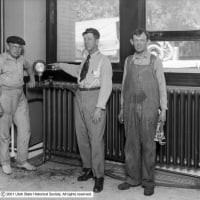Welcome! Here are the website rules, as well as some tips for using this forum.
Need to contact us? Visit https://heatinghelp.com/contact-us/.
Click here to Find a Contractor in your area.
If our community has helped you, please consider making a contribution to support this website. Thanks!
Tall buildings and Hydronics
Options

Mark Eatherton
Member Posts: 5,875
Those are either some hellacious boilers, or there are heat exchangers in the picture...
43 X 10 = 430'
430 X .434 = 186 PSI, no? Add 5 psi to this for purging and you are at 191 PSI at the bottom of the system.
ME
43 X 10 = 430'
430 X .434 = 186 PSI, no? Add 5 psi to this for purging and you are at 191 PSI at the bottom of the system.
ME
0
Comments
-
when you have basement mechanical rooms, and taller buildings, what are you guys doing to handle high pressure at the bottom of the system and relatively low pressure at the top to prevent air issues? Are you just using heavy pressure relief valves with jacked up pressure?
0 -
As an ex tall building guy I can answer you question. Generally there are multiple mechanical rooms spaced between a series of floors to prevent pressure.0 -
wow, that is a tall building. Thanks Josh
what about more moderate "tall buildings" like 4 to 6 floors in height?0 -
I'm used to mechanical rooms being in the penthouse in most of those applications.0 -
I would definitely agree that would be best!0 -
Similar situation
I run 2 /6-story office buildings, no hydronic heat, but cooling towers,open system, self-contained A.C. units on each floor, etc. Pumps, towers on roof, so the head pressure is low. Supply/return pressures 50-60 psi on 1st floor. Using 2 B&G 865 gpm. pumps in each building.0 -
10 stories, 75 psi relief, 60 psi running press, 2 boilers in basement, 2 cornell pumps moving the water. Bleeder valves in attic room to get air from mains after fill. Constant circ, works well...
TimJust a guy running some pipes.0 -
tall buildings run higher pressure --what do you consider a "tall" building --they have boilers rated for high pressure and a relief valve for that rating --there is no "jacking up" the relief -its made for the higher pressure -- i work on 1 building in Westchester that is 43 floors --2 boilers in the basement --pumps are rated for the pressure and volume of that buildings requirements ---- air seperators at the boilers supply pumping away --large vents on the top of the risers etc. bleeders at the individual units same as anywhere else0 -
Cleaver Brooks Water-tube boilers with Pro-fire burners i think the pressure ratings on them can go up to 500 psi0 -
Wow....
That is something I've never seen.
Adds REAL meaning to A.S.M.E. eh... (A Substantial Monetary Exchange :-0))
ME0 -
I can honestly say, after working in at least 40% of the tallest buildings in Seattle, that I have never seen a boiler operate over 100PSI. They always split up the mechanical rooms between floors or the boilers are in the penthouse.0 -
could be a difference
but seattle is seattle & new york is well.....new york.0 -
Milwaukee
Has quite a few buildings with steam as the primary heat source and convertors on every floor to hot water. Elevation is not an issue and the steam provides a very quick heat source.
Our tallest is only about 40 stories though. And the power plant provides the steam for quite a bit of the downtown.0 -
Touche0
This discussion has been closed.
Categories
- All Categories
- 87.3K THE MAIN WALL
- 3.2K A-C, Heat Pumps & Refrigeration
- 61 Biomass
- 429 Carbon Monoxide Awareness
- 120 Chimneys & Flues
- 2.1K Domestic Hot Water
- 5.8K Gas Heating
- 115 Geothermal
- 166 Indoor-Air Quality
- 3.7K Oil Heating
- 77 Pipe Deterioration
- 1K Plumbing
- 6.5K Radiant Heating
- 395 Solar
- 15.7K Strictly Steam
- 3.4K Thermostats and Controls
- 56 Water Quality
- 51 Industry Classes
- 50 Job Opportunities
- 18 Recall Announcements

